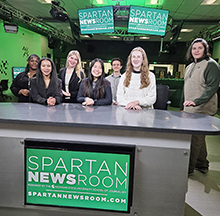Storytelling with data: tips for success
By Julia Belden
 This is the 2nd in a series of articles by Knight Center students who attended the recent annual conference of the National Association of Science Writers.
This is the 2nd in a series of articles by Knight Center students who attended the recent annual conference of the National Association of Science Writers.
On a chilly November Friday, a gaggle of journalists recently huddled around tables in a hotel ballroom , attempting – with varying levels of success – to filter Major League Baseball salary data on a Google Sheet.
The goal? Equip science journalists attending the National Association of Science Writers (NASW) annual conference with new and powerful reporting skills.
Crunching numbers and wrangling spreadsheets don’t conjure the mental image that most people think of when they imagine journalists, but the aptly named sub-field of “data journalism” does just that, and more.
Adam Rhodes, the training director for Investigative Reporters & Editors, led the journalists – including a group from the Knight Center for Environmental Journalism – through a step-by-step process to clean, filter and glean insights from datasets.

NASW data journalism photo: Investigative Reporters & Editors training director Adam Rhodes shows workshop attendees how to organize data in Google Sheets. Credit: Julia Belden
While modern data journalists typically do their work via computer, using data to discover and enhance news stories isn’t a new phenomenon, Rhodes said. For example, an 1848 story in The New York Tribune tracked milage expenditures of members of Congress, and journalist Ida B. Wells was the first to collect and analyze statistics about Black lynching victims in the U.S. in her 1895 pamphlet A Red Record.
Rhodes showed attendees where to find useful datasets online – government websites and reports are always sure bets – and how to prepare, or “clean,” the data for analysis. Continue reading


 Five environmental journalism students and Knight Center director Eric Freedman attended the recent annual conference of the National Association of Science Writers in Chicago.
Five environmental journalism students and Knight Center director Eric Freedman attended the recent annual conference of the National Association of Science Writers in Chicago. Also attending the conference from MSU were Knight Center master’s alum Ruth Thornton, university science public relations manager Emilie Lorditch, outreach specialist and MSU alum Ana Becerril of the Facility for Rare Isotope Beams and Angela Prete, a graduate student in microbial & molecular genetics.
Also attending the conference from MSU were Knight Center master’s alum Ruth Thornton, university science public relations manager Emilie Lorditch, outreach specialist and MSU alum Ana Becerril of the Facility for Rare Isotope Beams and Angela Prete, a graduate student in microbial & molecular genetics.

